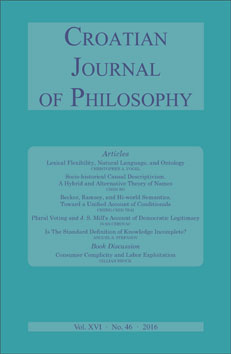Plural Voting and J. S. Mill’s Account of Democratic Legitimacy
Plural Voting and J. S. Mill’s Account of Democratic Legitimacy
Author(s): Ivan CerovacSubject(s): Political Philosophy, Civil Society, Electoral systems, History and theory of political science
Published by: KruZak
Keywords: Political legitimacy; plural voting; expertism; Mill; Christiano; epistemic democracy; division of epistemic labor;
Summary/Abstract: This paper clarifies some of the contested ideas put forward by John Stuart Mill by analyzing the reasons and arguments Mill used to support them and demonstrating how these ideas and arguments supporting them are connected into a coherent system. Mill’s theory is placed in wider explanatory framework of democratic legitimacy developed by Thomas Christiano, and is portrayed as a typical example of democratic instrumentalism—a monistic position that focuses on the outcomes and results of a decision-making process. Following this move, the focus is shifted on the understanding of political equality in Mill’s political thought. I claim that, contrary to some contemporary interpretations, Mill’s theory is based on a few fundamentally inegalitarian ideas. Finally, Mill’s view on the role of experts in democratic decision-making is analyzed and compared with contemporary theories advocating democratic expertism—Mill’s view is again portrayed as inegalitarian, both to the extent of setting political aims and creating methods for achieving these aims.
Journal: Croatian Journal of Philosophy
- Issue Year: XVI/2016
- Issue No: 46
- Page Range: 91-106
- Page Count: 16
- Language: English
- Content File-PDF

